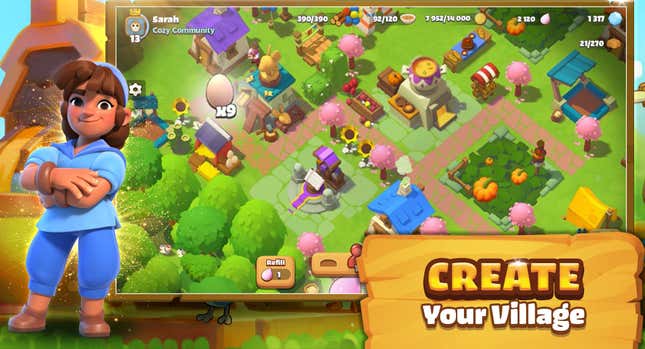
What do you do if you’re a developer so incredibly famous for one particular game, and you want to release something completely different? If you’re Supercell, the creators of mobile phenomenon Clash Of Clans, you create an entirely fake developer and soft-launch your new product under a fake name.
Everdale, officially announced yesterday as the new game from Supercell, has in fact been around since fall last year, under the blandly generic name Valleys & Villages. The free-to-download building game is focused around peaceful cooperation, putting ten players together to build their own villages within a larger valley, then trading resources, going on adventures, and forming a “Valley Guild”. The big emphasis for Everdale is on benevolence, teamwork, and the complete absence of conflict. Which, it’s fair to say, rather distinguishes it from Clash Of Clans.
It’s not, of course, the studio’s first peaceful game. In the same summer as CoC’s release in 2012, they also put out a game inspired by Farmville called Hay Day, which itself went on to amass millions of dollars for the Finnish developers. However, in the almost-decade since then, their games have been very much combat focused, with Boom Beach, Clash Royale, Brawl Stars and Clash Quest. It’s worth noting that for each of them, and indeed many abandoned projects, each was released first via a “soft-launch” in order to garner player feedback before releasing proper—something that’s pretty common in the mobile space.
Seemingly when it came to putting out something quite so different, Supercell worried this might prove trickier with their cultivated playerbase. (We’ve reached out to Supercell to ask about their motivations and experience, and will update should they reply.)
Under the name Osmium Interactive, Valleys & Villages was selectively released around the world on mobile devices, such that the developers could do all that player data scrutinization, noticing how the game was being played, or indeed not being played, and able to make all the tweaks and changes necessary to get the game as clicky and hooky as possible. Oh, and presumably listening to reviews posted to the stores.
Games soft-launched under their real names often end up with quite a hangover when it comes to their final release, stores smothered in potentially negative reviews of an unfinished version of the game. Launching with a new title on a new page certainly wipes the slate clean, once the earliest hiccups and issues are ironed out. While not a common tactic, this type of soft launch does happen from time to time in mobile game development. Supercell is just one of the bigger companies to do it recently.
Of course, this all comes with some risks as well. Not having their brand behind them must have surely made things nerve-wracking in terms of being sure to get enough players noticing their game. Still, it had over 50,000 installs and 900 reviews on Android alone, so clearly managed fine. Those reviews trended very positively, and it’s getting an even warmer reception via its official release.
It’s certainly an interesting approach to launching something brand new, avoiding issues of reputation—albeit a primarily positive one.
Update: 8.25.21, 4.43pm: Supercell got back to us to talk about the reasons behind their decisions.
“Early on, we realized that we needed the experience of many real players to truly understand how team play really works at a deep level,” project lead Lasse Seppänen told us by email. “At the same time, the launch of any new game from Supercell is going to be met by a lot of attention and scrutiny - which ordinarily would be a great thing. But we felt that this game in its early state wasn’t yet meeting the high-quality bar that we set for all Supercell games. We were faced with a dilemma: how do we quietly develop and improve a new game while also learning from real players at the same time?”
The solution was, of course, the fake name and studio. “For us,” Seppänen continues, “the importance of the player feedback was the biggest reason to try this new way of collecting it, and by player feedback we mean both the qualitative comments (from reviews, social media comments, etc) and the data we track as players progress through the game (retention, action completion rates, usage of features, do players get stuck, etc).”
Regarding whether this proved a challenge, given they were essentially starting a new company from scratch, Seppänen explained that they made strategic marketing choices early on to get eyes on the game. “We steadily improved the game during the alpha period and were very happy to see the game’s performance and player satisfaction improving as a result of those changes,” he tells us.
Those players who picked up Valleys & Villages will benefit from the process too, the game’s lead concludes. “We owe a huge debt of gratitude to the Valleys & Villages players, and we’re offering them a generous compensation in Everdale for their feedback & time.”